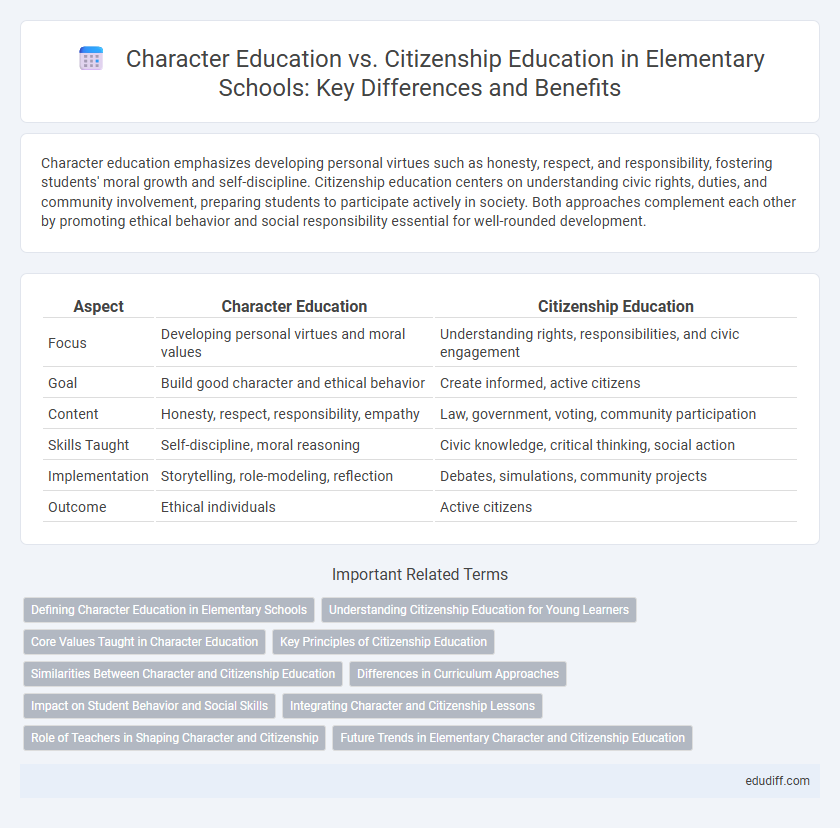Character education emphasizes developing personal virtues such as honesty, respect, and responsibility, fostering students' moral growth and self-discipline. Citizenship education centers on understanding civic rights, duties, and community involvement, preparing students to participate actively in society. Both approaches complement each other by promoting ethical behavior and social responsibility essential for well-rounded development.
Table of Comparison
| Aspect | Character Education | Citizenship Education |
|---|---|---|
| Focus | Developing personal virtues and moral values | Understanding rights, responsibilities, and civic engagement |
| Goal | Build good character and ethical behavior | Create informed, active citizens |
| Content | Honesty, respect, responsibility, empathy | Law, government, voting, community participation |
| Skills Taught | Self-discipline, moral reasoning | Civic knowledge, critical thinking, social action |
| Implementation | Storytelling, role-modeling, reflection | Debates, simulations, community projects |
| Outcome | Ethical individuals | Active citizens |
Defining Character Education in Elementary Schools
Character education in elementary schools emphasizes developing core values such as honesty, respect, responsibility, and kindness to nurture ethical decision-making and positive behavior in young students. This educational approach integrates social-emotional learning and moral reasoning to build a strong foundation for personal growth and interpersonal relationships. By fostering empathy, self-control, and integrity, character education supports the holistic development essential for lifelong success and community engagement.
Understanding Citizenship Education for Young Learners
Citizenship education for young learners emphasizes developing awareness of rights, responsibilities, and community participation, fostering skills for active and informed involvement in society. It integrates practical experiences such as classroom discussions, role-playing, and community projects to build empathy, respect, and social responsibility. This approach differs from character education by focusing more on societal roles and civic engagement rather than solely on individual moral values.
Core Values Taught in Character Education
Character education emphasizes core values such as honesty, respect, responsibility, empathy, and fairness, which help shape moral behavior and personal integrity in elementary students. Citizenship education focuses on rights, duties, and participation in community and government, promoting understanding of civic responsibilities. Both programs build essential qualities, but character education directly targets individual virtues that support positive social interactions.
Key Principles of Citizenship Education
Citizenship Education centers on developing students' understanding of rights, responsibilities, and active participation in their communities. Core principles include promoting civic knowledge, fostering social cohesion, and encouraging democratic values such as respect, tolerance, and inclusion. This approach equips students with the skills needed to engage thoughtfully in societal issues and contribute positively to civic life.
Similarities Between Character and Citizenship Education
Character education and citizenship education both emphasize developing students' moral values and social responsibility. They aim to foster respect, empathy, and active participation within communities, encouraging students to contribute positively to society. Core principles such as honesty, fairness, and respect form the foundation of both educational approaches, promoting well-rounded, ethical individuals.
Differences in Curriculum Approaches
Character Education emphasizes personal virtues such as honesty, respect, and responsibility through stories, role-playing, and reflective activities. Citizenship Education focuses on understanding rights, duties, government systems, and community involvement via discussions, projects, and civic simulations. The curriculum of Character Education targets moral development, while Citizenship Education aims to build informed and active members of society.
Impact on Student Behavior and Social Skills
Character education emphasizes developing traits like honesty, empathy, and responsibility, leading to improved self-discipline and positive peer interactions among elementary students. Citizenship education focuses on understanding civic responsibilities, promoting respect for rules, and encouraging community involvement, which enhances teamwork and cooperative behavior. Both approaches significantly contribute to better student behavior and stronger social skills by fostering moral values and social awareness.
Integrating Character and Citizenship Lessons
Integrating character education and citizenship education in elementary classrooms fosters moral development alongside civic responsibility, encouraging students to practice empathy, respect, and active community participation. Lessons that combine ethical decision-making with an understanding of rights and duties help children develop into conscientious citizens who contribute positively to society. Embedding these themes in daily activities enhances students' social skills and prepares them for collaborative problem-solving and leadership roles.
Role of Teachers in Shaping Character and Citizenship
Teachers play a crucial role in shaping both character and citizenship by modeling ethical behavior and fostering social responsibility among elementary students. Through guided activities and discussions, educators help children develop empathy, integrity, and respect for community values. Integrating character education with citizenship lessons enhances students' understanding of their roles within society and their impact on the collective well-being.
Future Trends in Elementary Character and Citizenship Education
Future trends in elementary character and citizenship education emphasize integrating social-emotional learning with civic responsibility to foster well-rounded students. Innovative curricula increasingly incorporate digital citizenship, environmental stewardship, and global awareness to prepare children for interconnected communities. Technology-enhanced learning tools and project-based experiences support active engagement in character development and civic participation from an early age.
Character Education vs Citizenship Education Infographic

 edudiff.com
edudiff.com